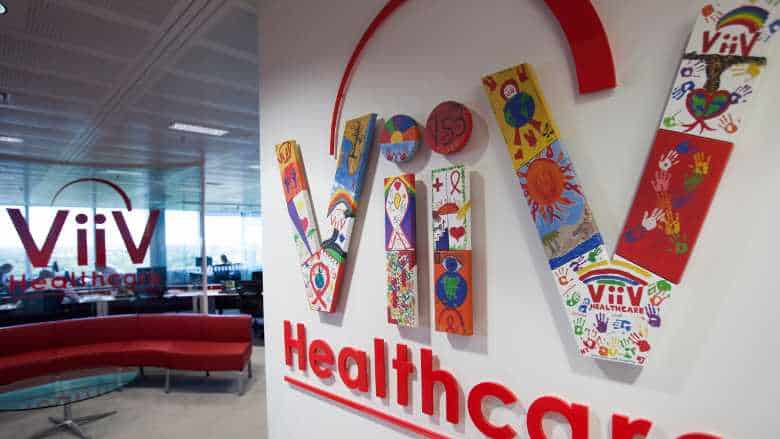
GSK mulls $27 billion ViiV sell-off
pharmafile | October 23, 2014 | News story | Medical Communications, Sales and Marketing | AIDS, Advair, GSK, HIV, Pfizer, Q3, Shionogi, Tivicay, ViiV
After a difficult few years and another poor quarter, GlaxoSmithKline has announced that it is looking to float its fast-growing HIV drugs business ViiV Healthcare to help shore up its finances.
The ViiV venture which is 80%-owned by GSK, with Pfizer and Shionogi owning the remaining 20%, has recently launched the HIV medicine Tivicay (dolutegravir), which has brought in strong sales.
As majority owner, GSK says it is now looking to make an initial public offering of a minority stake in ViiV Healthcare. Analysts at Jefferies say they value the HIV and AIDS division at about £17 billion ($27 billion) – and the business grew 12% to just over £1 billion for the first nine months of the year.
The company itself has also received kudos by ranking top this year in a poll of the most reputable pharma companies, according to a recent survey of 800 patient groups by PatientView.
In a meeting with reporters Sir Andrew Witty, GSK’s chief executive, says ViiV would be among the top 40 companies in London’s FTSE 100 index and would outrank such household names as retailers Marks and Spencer and Sainsbury’s.
He says: “Five years ago, we created ViiV Healthcare, a new standalone global business focussed on development of treatments for HIV. This has been a highly innovative and successful venture with our equity partners Pfizer and Shionogi.
“The business has made very significant progress in both R&D and commercial execution, culminating in the recent successful launches of Tivicay and Triumeq.
“We believe now is the right time to explore the potential for an IPO of a minority shareholding in this business. This will provide greater visibility of the intrinsic value we see in its currently marketed assets and future pipeline and also enhance potential future strategic flexibility.”
Sir Andrew adds that there will be ‘no rush’ to sell and has not given a timetable for when the IPO will go ahead, although 2015 is the most likely date for the first public offering.
Third quarter and cost cutting measures
The float is part of a recovery plan that includes a fresh round of cost-cutting and comes after the firm announced its latest third quarter results.
The new restructuring programme which is aimed at stopping what has proven a long financial slide for GSK, would save £1 billion in annual costs within three years – with half of that achieved by 2016 according to the company.
At constant exchange rates (CER), GSK sales were down 3% for the third quarter to £5.64 billion, and dropped 10% in local currencies. This was repeated for the first nine months of the year, also down 3% CER to £16.82 billion.
Major falls in revenue stem from the mature markets, with a 10% slide in the third quarter in the US and a 2% drop in European sales, although it continues to do well in emerging markets.
In terms of products the biggest culprit for these losses was its top-selling respiratory drug Advair, which was down 14% for the third quarter to £976 million, and by the same 14% for the first nine months with sales pegged at £3.1 billion.
The drug has been facing particular pricing pressure in the US, the biggest market for the medicine, and also generic pressures in the EU. GSK is hoping two new inhaled respiratory medicines, namely Breo and Anoro that are set to be next generation versions of Advair, will fill the gap left behind from the blockbuster treatment.
Their uptake so far has been slow however, a situation that has disappointed analysts given the reliance GSK has on its respiratory business. Sir Andrew says he does not in fact expect this unit to return to growth until 2016.
This cost cutting also comes ahead of a major pact with Swiss rivals Novartis, which from next year will see the manufacturers combine their consumer health units under GSK’s majority (63.5%) control, while also in effect swapping some of their major assets.
GSK will also sell its cancer portfolio to Novartis for a maximum of $16 billion, and in turn Novartis will let GSK acquire its own vaccines business for up to $7.1 billion – a business that made a loss in the last quarter.
Selling off a part of ViiV and making the swap with Novartis are all part of a larger strategic plan to help the company as it struggles to mould financial form through its core products. In the longer term, however, GSK will need several strong blockbuster medicines to help appease its anxious shareholders.
Painful times
Sir Andrew knows the task ahead and admitted to journalists that his company is enduring a ‘painful’ period.
This includes a recent $490 million fine from the Chinese government after it found GSK China “offered money or property to non-government personnel in order to obtain improper commercial gains, and been found guilty of bribing non-government personnel”.
The money is a small sum in context – it received a $3 billion fine in 2012 for past marketing abuses – but the year-long saga dragged down the firm’s reputation, which it spends much time trying to protect.
Ben Adams
Related Content

Pfizer’s Beqvez approved by FDA for haemophilia B treatment
Pfizer has announced that the US Food and Drug Administration (FDA) has approved Beqvez (fidanacogene …

GSK’s Jemperli accepted for FDA review for endometrial cancer treatment
GSK has announced that the US Food and Drug Administration (FDA) has accepted its supplemental …

EC approves Pfizer’s Emblaveo for multidrug-resistant infection treatment
Pfizer has announced that the European Commission (EC) has granted marketing authorisation for Emblaveo (aztreonam-avibactam) …








